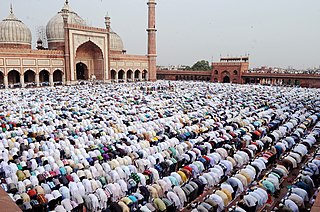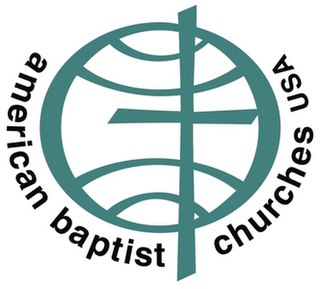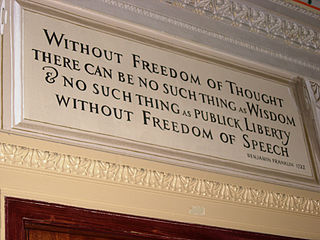Baptists form a major branch of Protestantism distinguished by baptizing only professing Christian believers, and doing so by complete immersion. Baptist churches also generally subscribe to the doctrines of soul competency, sola fide, sola scriptura and congregationalist church government. Baptists generally recognize two ordinances: baptism and communion.

Roger Williams was an English-born New England Puritan minister, theologian, and author who founded Providence Plantations, which became the Colony of Rhode Island and Providence Plantations and later the State of Rhode Island and Providence Plantations. He was a staunch advocate for religious freedom, separation of church and state, and fair dealings with the Native Americans.

Freedom of religion or religious liberty is a principle that supports the freedom of an individual or community, in public or private, to manifest religion or belief in teaching, practice, worship, and observance. It also includes the freedom to change one's religion or beliefs, "the right not to profess any religion or belief", or "not to practise a religion".

The Southern Baptist Convention (SBC), alternatively the Great Commission Baptists (GCB), is a Christian denomination based in the United States. It is the world's largest Baptist denomination, and the largest Protestant and second-largest Christian denomination in the United States. In 1845 the Southern Baptists separated from the Triennial Convention in order to support slavery, which the southern churches regarded as "an institution of heaven". During the 19th and most of the 20th century, it played a central role in Southern racial attitudes, supporting racial segregation and the Lost Cause of the Confederacy while opposing interracial marriage. In 1995, the organization apologized for its history. Since the 1940s, it has spread across the U.S. states, having member churches across the country and 41 affiliated state conventions.

The American Baptist Churches USA (ABCUSA) is a Baptist Christian denomination established in 1907 originally as the Northern Baptist Convention, and from 1950 to 1972 as the American Baptist Convention. It traces its history to the First Baptist Church in America (1638) and the Baptist congregational associations which organized the Triennial Convention in 1814. Headquartered in Valley Forge, Pennsylvania, ABCUSA is usually considered mainline, although varying theological and mission emphases may be found among its congregations, including modernist, charismatic and evangelical orientations.
The Baptist Faith and Message (BF&M) is the statement of faith of the Southern Baptist Convention (SBC). It summarizes key Southern Baptist thought in the areas of the Bible and its authority, the nature of God as expressed by the Trinity, the spiritual condition of man, God's plan of grace and salvation, the purpose of the local church, ordinances, evangelism, Christian education, interaction with society, religious liberty, and the family.

The Baptist General Convention of Texas (BGCT), more commonly known as the Texas Baptists, is the oldest surviving Baptist Christian denomination in the U.S. state of Texas. Primarily affiliated with the Baptist World Alliance, the Texas Baptists are nominally affiliated with the Southern Baptist Convention and operates more autonomously than other affiliated state conventions.

The Cooperative Baptist Fellowship (CBF) is a Baptist Christian denomination in the United States. It is affiliated with the Baptist World Alliance. The headquarters is in Decatur, Georgia.

Religion in the United States began with the religions and spiritual practices of Native Americans. Later, religion also played a role in the founding of some colonies, as many colonists, such as the Puritans, came to escape religious persecution. Historians debate how much influence religion, specifically Christianity and more specifically Protestantism, had on the American Revolution. Many of the Founding Fathers were active in a local Protestant church; some of them had deist sentiments, such as Thomas Jefferson, Benjamin Franklin, and George Washington. Some researchers and authors have referred to the United States as a "Protestant nation" or "founded on Protestant principles," specifically emphasizing its Calvinist heritage. Others stress the secular character of the American Revolution and note the secular character of the nation's founding documents.

John Clarke was a physician, Baptist minister, co-founder of the Colony of Rhode Island and Providence Plantations, author of its influential charter, and a leading advocate of religious freedom in America.

Freedom of thought is the freedom of an individual to hold or consider a fact, viewpoint, or thought, independent of others' viewpoints.
"Separation of church and state" is a metaphor paraphrased from Thomas Jefferson and used by others in discussions regarding the Establishment Clause and Free Exercise Clause of the First Amendment to the United States Constitution which reads: "Congress shall make no law respecting an establishment of religion, or prohibiting the free exercise thereof..."
Mainstream Baptists is a network of Baptists in fourteen U.S. states that have organized to uphold historic Baptist principles, particularly separation of church and state, and to oppose Fundamentalism and Theocratic Calvinism within the Southern Baptist Convention. As such, it is not a denomination, but rather an organization that provides resources, support, and interagency communication. Organizations/agencies considered to share Mainstream Baptists and cooperate with and support the network are listed below under External links.
Separation of church and state is one of the primary theological distinctions of the Baptist tradition.

Richard Albert Mohler Jr. is an American evangelical theologian, the ninth president of The Southern Baptist Theological Seminary in Louisville, Kentucky, and host of the podcast The Briefing, where he daily analyzes the news and recent events from an evangelical perspective.
Within the Latter Day Saint movement, the "Articles of Faith" is a statement of beliefs composed by Joseph Smith as part of an 1842 letter sent to "Long" John Wentworth, editor of the Chicago Democrat, and first published in the Latter Day Saint newspaper Times and Seasons. It is a concise listing of thirteen fundamental doctrines of Mormonism. Most Latter Day Saint denominations view the articles as an authoritative statement of basic theology. Some denominations, such as the Church of Jesus Christ of Latter-day Saints, have adopted the articles as scripture. For some sects, the Articles of Faith are known collectively as "An Epitome of Faith and Doctrine".
Approximately 15.3% of Americans identify as Baptist, making Baptists the second-largest religious group in the United States, after Roman Catholics. Baptists adhere to a congregationalist structure, so local church congregations are generally self-regulating and autonomous, meaning that their broadly Christian religious beliefs can and do vary. Baptists make up a significant portion of evangelicals in the United States and approximately one third of all Protestants in the United States. Divisions among Baptists have resulted in numerous Baptist bodies, some with long histories and others more recently organized. There are also many Baptists operating independently or practicing their faith in entirely independent congregations.

George Washington Truett, also known as George W. Truett, was an American clergyman who was the pastor of the First Baptist Church of Dallas, Texas, from 1897 until 1944, and the president of the Southern Baptist Convention from 1927 to 1929. He was one of the "most famous Southern Baptist" preachers and writers of his era.

Religion of black Americans refers to the religious and spiritual practices of African Americans. Historians generally agree that the religious life of black Americans "forms the foundation of their community life". Before 1775 there was scattered evidence of organized religion among black people in the Thirteen Colonies. The Methodist and Baptist churches became much more active in the 1780s. Their growth was quite rapid for the next 150 years, until their membership included the majority of black Americans.
The multilateral foreign policy of the Holy See is particularly active on some issues, such as human rights, disarmament, and economic and social development, which are dealt with in international fora.












